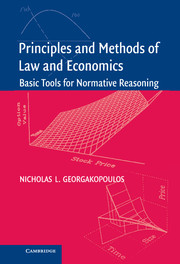Book contents
- Frontmatter
- Contents
- Preface
- INTRODUCTION: INNOVATION IN LEGAL THINKING
- PART 1 PRINCIPLES
- PART 2 METHODS
- 7 MATHEMATICAL MODELING
- 8 CONFRONTING UNCERTAINTY: BASIC PROBABILITY THEORY
- 9 ADVANCED PROBABILITY: DISTRIBUTIONS AS THE SHAPE OF RANDOMNESS
- 10 HOW TO PRICE UNCERTAINTY: FINANCE
- 11 FINANCE AND PROBABILITY: OPTIONS AND DERIVATIVES
- 12 USING SPREADSHEETS
- 13 STATISTICS
- 14 CONCLUSION: IMPORTING METHODOLOGICAL INNOVATIONS
- APPENDIX A MEINHARD V. SALMON 249 N.Y. 458 (1928)
- APPENDIX B GLOSSARY
- APPENDIX C MATHEMATICA NOTEBOOKS
- Index
12 - USING SPREADSHEETS
Published online by Cambridge University Press: 24 July 2009
- Frontmatter
- Contents
- Preface
- INTRODUCTION: INNOVATION IN LEGAL THINKING
- PART 1 PRINCIPLES
- PART 2 METHODS
- 7 MATHEMATICAL MODELING
- 8 CONFRONTING UNCERTAINTY: BASIC PROBABILITY THEORY
- 9 ADVANCED PROBABILITY: DISTRIBUTIONS AS THE SHAPE OF RANDOMNESS
- 10 HOW TO PRICE UNCERTAINTY: FINANCE
- 11 FINANCE AND PROBABILITY: OPTIONS AND DERIVATIVES
- 12 USING SPREADSHEETS
- 13 STATISTICS
- 14 CONCLUSION: IMPORTING METHODOLOGICAL INNOVATIONS
- APPENDIX A MEINHARD V. SALMON 249 N.Y. 458 (1928)
- APPENDIX B GLOSSARY
- APPENDIX C MATHEMATICA NOTEBOOKS
- Index
Summary
This chapter lays the foundation for the introduction of statistics by Chapter 13. Statistical analysis easily becomes concrete with a tool that processes the mathematics. Spreadsheet software is such a tool. Spreadsheets are surprisingly useful. This should come as no surprise, given their popularity. Readers who have a significant level of comfort with spreadsheets or who intend to use different software for statistical analysis can skip this chapter.
Some scholars have questioned the capacity of spreadsheets to perform statistical calculations with the appropriate accuracy. The popularity of spreadsheets suggests the opposite may be true. Programs occasionally have bugs but bugs in popular programs are more likely to be identified and will tend to be identified sooner and be corrected faster. The experience with an error in some Pentium III chips is a good example of how popularity breeds robustness. The error was covered in the popular press, and not only did the manufacturer correct the error but the press reported how users could overcome Excel's tendency to preserve the false calculation in old spreadsheets.
THE BASICS
A spreadsheet program is the next step in the evolution of calculating devices. As revolutionary as the electronic calculator might have seemed to the users of the abacus and engineers' rulers, spreadsheet programs are an even greater change. Spreadsheets change the very concept of calculating and the level of complexity to which calculations can be taken. Because of the power of spreadsheets, not being able to use spreadsheets is a major handicap.
Information
- Type
- Chapter
- Information
- Principles and Methods of Law and EconomicsEnhancing Normative Analysis, pp. 249 - 282Publisher: Cambridge University PressPrint publication year: 2005
